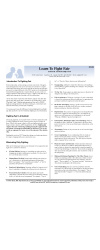After hundreds of years, research, books, we know remarkably little about what effective leadership is about
There are dozens, if not hundreds of leadership models that “explain” what constitutes effective leadership. And hundreds of books. However, if we step back a bit, what do we really know for sure about effective leadership? Actually, almost nothing. In fact, there’s only one thing that we know for sure. Leadership effectiveness depends on the FIT between a particular leader, and the context within which he or she works. As you’ll see, this simple fact has huge implications for choosing leaders, and developing them.
It means that a leader who is effective in one situation may be disasterous, or simply ineffective if that same person works within a different context. It means that it’s not possible to predict what leader, what person will be effective in any particular further situation. Context, or “fit” is everything.
The Supporting Data
We like to think of our favorite leaders as superbly effective, and so there’s a tendency to forget that most leaders, even those who are held up as role models for future leaders inevitably failed about as much as they succeeded. Let’s look at some example.
Steve Jobs: Success, Followed By Failure, Then Another Failure, Then Success
The late Steve Jobs (Apple) is often considered one of the most successful corporate CEO’s of his generation. Starting in a garage, he pioneered Apple, and brought it to relative maturity and a corporate success. Until he didn’t. It’s easy to forget that Jobs was unceremoniously bounced from Apple, and replaced with John Scully as CEO. And for reasons almost directly tied to the way he lead the company. His pitting of the Mac people vs. the Apple II shook the company apart. Not only did products suffer, but the internal climate of the company made it difficult to actually work there.
Jobs, after his ouster, started another company, NEXT computers, which managed to tank in terms of sales, although it is credited with making major contributions to the tech field. In most respects, NEXT was a commercial failure under Jobs, having given up its hardware business completely by the time it was purchased by APPLE, which ended up having the unexpected result of having Jobs return as Apple CEO.
And then in a second stint, Apple took off, much of its success credited to Jobs leadership.
So, success, then failure at the same company, then failure at NEXT and finally success once again upon his return.
Perhaps Jobs changed as time went by, but the likely explanation for this bumpy ride is that he “fit” for startups, did not fit for more mature companies, and then on his return to APPLE, once again fit for the times and situation.
President Jimmy Carter
Of all the modern American presidents that did NOT get impeached, Carter is probably ranked as one of the most ineffective presidents of the times. He failed to capture the imagination and loyalty of the people, and seemed to come across as weak, and just ineffective. Oddly enough, if you look at Presidents after they were out of office, Carter is probably the ONLY modern president to be an incredibly effective leader after his presidency. His work, and leadership in various causes, and as an unofficial and partly official peace envoy are landmarks in American diplomacy, resulting in his being awareded the Nobel Peace Prize in 1992.
So, was/is Jimmy Carter a great leader? Not so much a good fit for his presidency, but certainly a phenomenal leader after. His skills and approach simply didn’t fit the demands of the presidency at that time, but did fit the various needs of the roles he played later on. For Carter, it was all about fit. And about finding roles where his set of skills and knowledge could be used to the maximum.
Pick Your Sports Coach
If you are a sports fan, and you’ve been observant over the years, you’ll already know that there are almost NO examples of sports coaches (football coaches, baseball managers) who succeeded as leaders over an entire career. Almost all have the same pattern. They succeeded in one position, until they no longer did. If they moved on to other positions, whether they were successful or not ended up as a kind of fifty-fifty proposition. Most baseball managers had good stretches, and bad, then good, then bad, and not only when measured by wins and losses, but also measured by their status in the eyes of their players.
The explanation, once again, is fit. It always comes down to the same thing: How well does a coach fit with the team, its personnel, owners, general manager, stage of development (is it improving personnel or an aging team), even the city. That’s what determines success. Context.
Implications – A Little Scary
You’d think that it would be possible to identify, in advance, what “kind” of leader an organization needs, so it could be possible to choose a leader to fit for that time. Unfortunately, as I said, the ONLY thing we know about leadership is that it all depends on context. We simply are not able to predict, with any success, what person will thrive in one leadership role, and not in another. That’s because not only are there so many contextual factors involved in determining that fit but we don’t even KNOW what they are, or more importantly, how those factors interact with each other. What we have is a situations that is so complex that all the variables that determine success interact so that each “match” of leader to context variables is, in effect, an singularity, or in simple terms, unique. That’s typical of complex systems, and the more complex the more unknowable, so we may never be able to understand them well enough to predict.
It also means that a leader succeeding NOW may not be a success next year, not because his or her skills and abilities have gotten worse, or that he or she is no longer a “good leader”, but that the needs of the organization, and the environment in which it operates has changed.
And of course, what about leadership development? Stay tuned. We’ll have more on this in the future, but meantime, if you are reading this where you can comment, I’d certainly like to hear your take.






